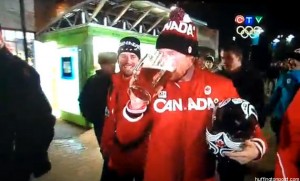 Our readers in Canada will surely recognize Jon Montgomery.
Our readers in Canada will surely recognize Jon Montgomery.
After all, he became the “poster boy” for Canadian pride when he chugged a pitcher of beer while walking through the streets of Whistler following his Gold Medal performance in the Men’s Skeleton event during the 2010 Winter Olympics.
His “down to earth” demeanor and infectous enthusiam on the medal podium was something Canadians could relate to and be proud of.
In fact, it can be argued that his performance (both on and off the track) during the 2010 Vancouver Winter Olympics, could go down as one of the most defining and proud moments in Canadian history.
Jon Montgomery Creates “I Am Canadian” Spoof Video To Encourage Support For Canadian Athletes
With the Winter Olympics 2 years in the rear view mirror, there is a growing concern that Canadian support for their athletes will take a hit in 2012. So, Jon decided to do up a “spoof” video to encourage Canadians to support their athletes as they compete for Gold in London. And, in turn, he was able to build his own personal brand online in the process.
Watch the original “I Am Canadian” video here –> http://www.youtube.com/watch?v=BRI-A3vakVg&
Jon’s video below is a spoof on the hugely successful “I Am Canadian” campaign launched by Molson Canadian back in 2000. The “I Am Canadian” rant used nationalism as a platform. the ad starred a man named Joe: an “average Canadian”, standing in a movie theatre, with a cinema screen behind him showing different images relating to Canadian culture. Joe proceeds to give a speech about what is it to be a Canadian and what it is not to be a Canadian, making particular efforts to distinguish himself both from common Canadian stereotypes of Americans (“I believe in peacekeeping, not policing”) and common American stereotypes of Canadians (“I don’t live in an igloo,” “I say ‘about,’ not ‘aboot'”)
Jon “Canadian” Montgomery: Good Luck and Git’er Done in London 2012
Social Media Helps Amateur Athletes Secure Sponsorship
In a world where amateur athletes are faced with funding challenges, it is encouraging to see them embrace social media to build their personal brand and raise awareness and support for amateur sport in their country (Especially in Canada where funding and sponsorship for amateur athletes is considerably less than that of US Olympians).
By building affinity with an audience online, amateur athletes can make themselves “more attractive” to potential sponsors that want to leverage their affinity and reach to get their brand in front of their fan base.
With the Olympic Games taking place only once every 4 years, there is a short window of time for these amateur athletes to truly leverage their time in the international spotlight and provide the value that sponsors are looking for in exchange for sponsorship funding.
Is 2012 Really The “First Social Media Olympics”?
With the 2012 London Olympics being coined as “The First Social Media Olympics”, you’d think that there would be plenty of opportunity for athletes to provide a behind the scenes look at their experience at the games (and add value for current or potential sponsors). However, the IOC has implemented a restrictive social media policy that deters athletes from using social media during the London 2012 Summer Games.
Learn More About The IOC Social Media Policy Here –> An Olympian Struggle: IOC vs Social Media
Ultimately, the IOC Social Media Policy is in place to protect the branding rights of Olympics sponsors (like McDonalds, Coca-Cola, Adidas and British Airways) that are spending millions of dollars to have exclusive sponsorship rights during the games. But, what makes sense in theory, might prove to be an impossible feat to police in today’s digital world.
Is Nike The First Of Many “Non-Olympic Sponsors” That Will Be Punished?
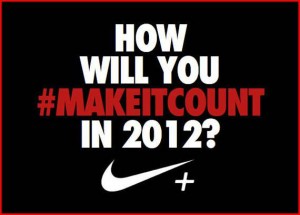 We have already seen one high profile example of a brand getting shut down by the Advertising Standards Authority. Promoted tweets by England soccer stars Wayne Rooney and Jack Wilshere, were part of Nike’s “Make it Count” campaign.
We have already seen one high profile example of a brand getting shut down by the Advertising Standards Authority. Promoted tweets by England soccer stars Wayne Rooney and Jack Wilshere, were part of Nike’s “Make it Count” campaign.
As a result, the ASA has ruled that the Nike reference could have been missed and in a landmark ruling, the ASA has upheld a complaint against a Twitter campaign. The first time since social networks came under its remit in March 2012
Nike is now challenging the ruling, but regardless of the outcome, it can be argued that Nike’s campaign is already a success (and will continue to be a success throughout the games).
After all, how does the IOC and the Advertising Standards Authority plan to monitor and shut down all Twitter accounts that use the hashtag #makeitcount?
Just look at this Twitter search for #makeitcount –> https://twitter.com/#!/search/%23makeitcount
On A Side Note: You Have To LOVE What Oddbins Are Doing
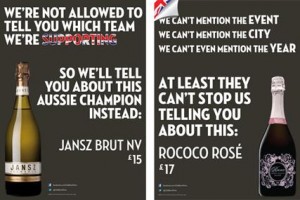 According to LOCOG, the London Organizing Committee of the Olympic and Paralympic Games, “The London 2012 brand needs to be closely protected to ensure that funds can be raised”. And, any business caught using the brand in an inappropriate way, will be dealt with accordingly.
According to LOCOG, the London Organizing Committee of the Olympic and Paralympic Games, “The London 2012 brand needs to be closely protected to ensure that funds can be raised”. And, any business caught using the brand in an inappropriate way, will be dealt with accordingly.
With that in mind, there are bound to be a number of “Ambush Marketing” attempts during the Games. And, one of the first examples of this could be a promotion that was recently launched by a specialty wine company in London called Oddbins.
Click here to learn more -> Oddbins To Fight Back Against LOCOG branding restrictions
To summarize their promotion, Oddbins is offering a 30% discount off their purchase to any customers wearing Nike trainers who has in their pocket a set of Vauxhall car keys, an RBS MasterCard, an iPhone, a bill from British Gas and a receipt for a Pepsi bought at KFC.
In a statement by Oddbins managing director Ayo Akintola, he said:
“The London Olympics is a once-in-a-lifetime opportunity for the whole of the UK’s business community to come together to support our fantastic athletes and celebrate an awe-inspiring festival of sport.
“But thanks to Locog any business without the tens of millions of pounds required to join the cabal of multinational brand partners for the Games are reduced to the status of beggars on the gilded streets of the Olympic movement.
“We have taken steps to ensure our planned window displays do not flout any of these asinine rules, but we are doing this primarily to highlight the absurdity of the fact that the British people – who are paying for these games – are at the same time being subject to ridiculous rules. Even though our window designs will be within the rules, we would not be surprised if Locog goes loco.”
What are your thoughts on amateur athletes using social media? Does the protection of Corporate Sponsor rights justify the strict social media policies in place during the 2012 London Summer Olympics? Let us know in the comments below or send us a tweet to @sportsnetworker



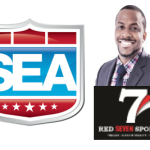
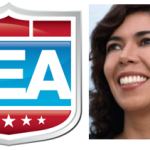
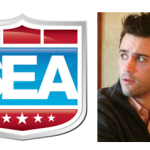
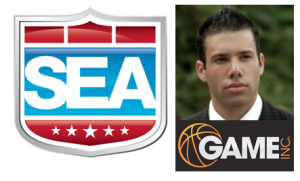
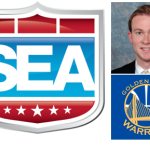
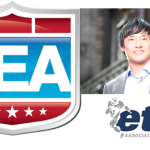
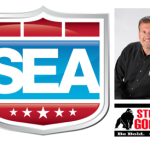

absolutely
I think it’s absolutely ridiculous to monitor the social media accounts of Olympians so closely and after reading the policy, it’s too strict and there are many parts that don’t make sense.
However, as an Olympian, it is their duty to uphold the requests of the IOC. If they chose to participate, they chose to follow the rules, no matter how ridiculous they appear.
Thank you for writing! It is very easy to understand and detail. I find it interesting, I hope you continue to have such good posts.
boxnovel